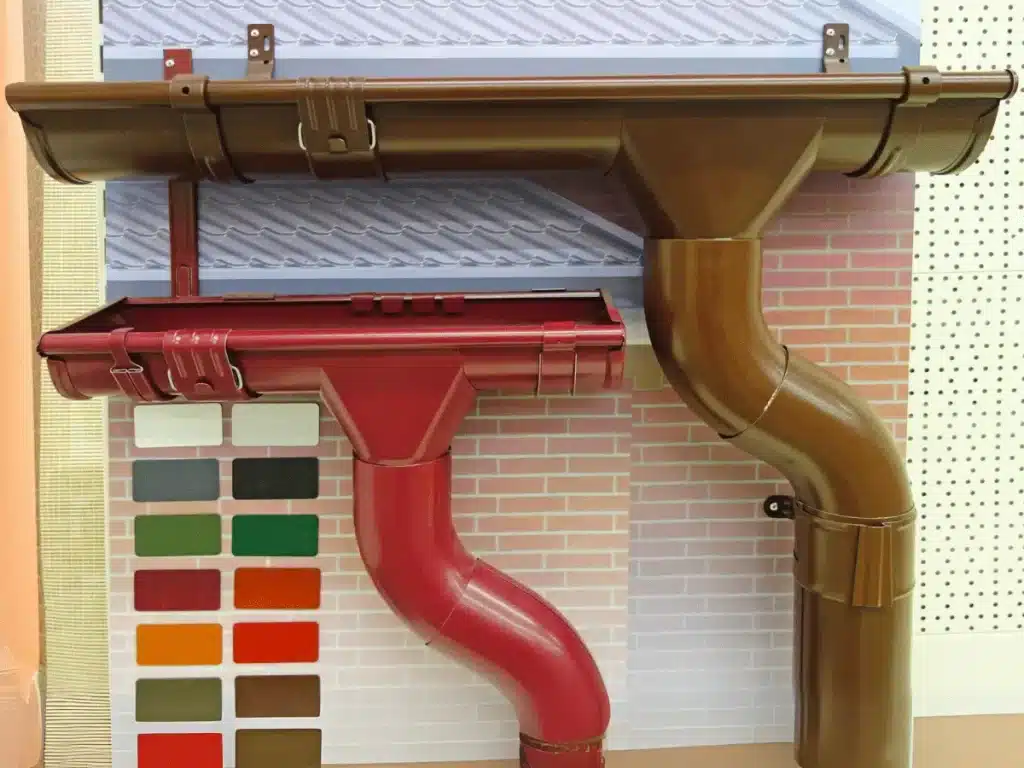
Have you ever heard the phrase “a home’s first line of defense”? Yep, that’s the gutters! They quietly protect your home from water damage and work tirelessly in the background.
But with so many gutter materials available, how do you pick the right one? We will help you with that!
Today, we’ll discuss gutter materials and reveal the most popular types for your home and gutter system. Let’s dig in!
Types of Gutter Materials
Choosing the right gutter material is crucial for maintaining your home’s exterior and foundation. Each type of material has its unique benefits and drawbacks. Let’s explore the most popular options.
Aluminum Gutter
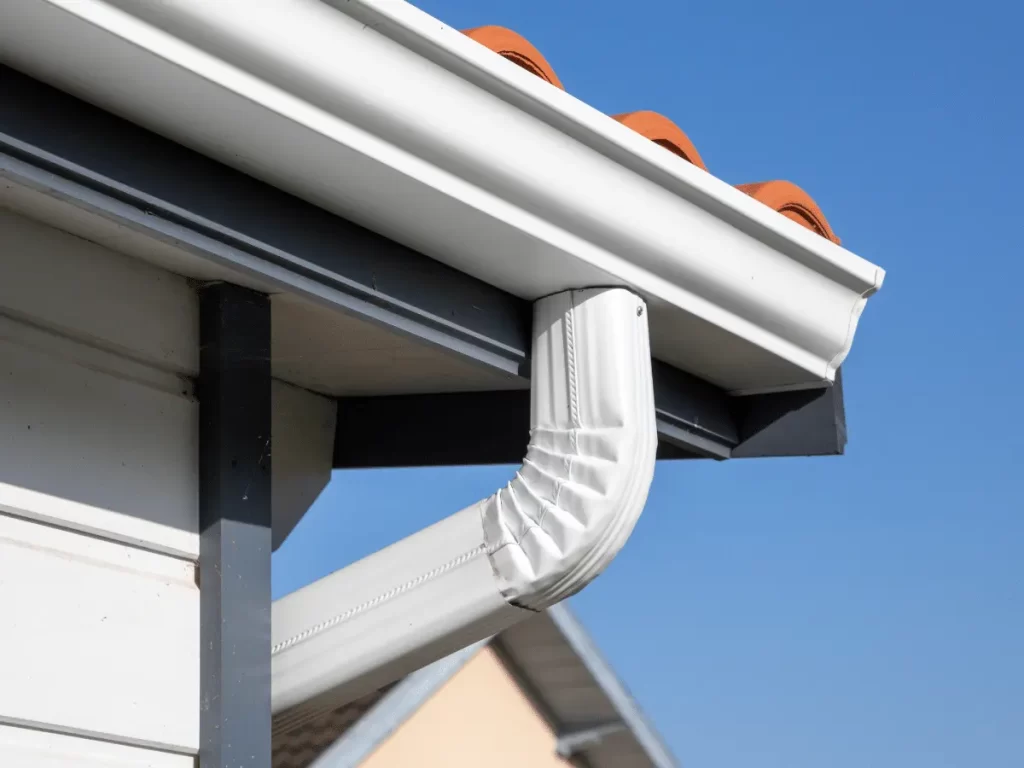
An Aluminum gutter ranks high among residential choices. They’re famed for their lightness and easy installation.
Aluminum is flexible and allows for different profiles like the aluminum K-style gutter or the half-round gutter. The gutters match various architectural styles. Plus, seamless aluminum designs minimize leaks and boost durability.
Pros of Aluminum Gutters:
- Lightweight and Easy to Install: Aluminum gutters are super light, making DIY installation a breeze. Homeowners can handle small projects over a weekend without heavy machinery or professional assistance.
- Rust Resistance: Unlike steel, aluminum doesn’t rust, making it ideal for humid or rainy regions. Coastal homeowners favor aluminum due to its rust-resistant quality, even in salty air.
- Color Variety: Aluminum gutters come in numerous colors, letting homeowners match them with their house’s exterior, and enhancing curb appeal.
- Affordability: Aluminum is budget-friendly compared to copper or stainless steel, making it popular among cost-conscious homeowners seeking durability.
Cons of Aluminum Gutters
- Prone to Dents: An Aluminum gutter can dent easily, especially from fallen tree branches or physical impacts. Homeowners must be careful during roof cleaning or tree trimming to avoid damage.
- Warping in Extreme Temperatures: Temperature fluctuations can cause aluminum gutters to warp, affecting functionality and potentially causing water damage.
- Requires Frequent Repairs: Dents and warping mean an aluminum gutter needs regular maintenance and repairs to prevent larger issues.
- Corrosion Over Time: While resistant to rust, aluminum can still corrode over time, necessitating regular cleaning and maintenance to preserve longevity.
Copper Gutters
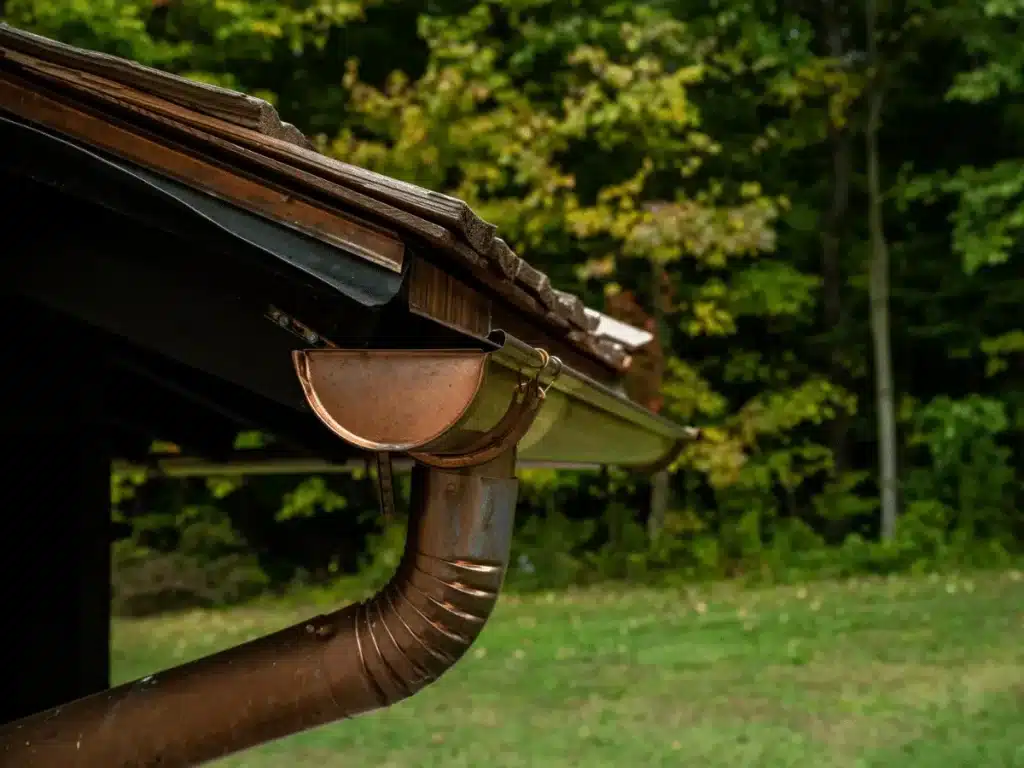
A Copper gutter is known for its beauty and longevity. These gutters change color over time, which gives a unique look. Copper products resist rust and last many years with little care. They are often used in high-end and historic homes.
Pros of Copper Gutters
- Long-Lasting: Copper gutters can last over 50 years, even up to 100 years with proper care. They are a good investment due to their long life.
- Looks Great: Over time, copper develops a green patina, adding a classic charm to your home.
- Low Care: Copper does not rust, so it needs less maintenance. Homeowners can rely on their long-lasting performance.
- Boosts Home Value: A Copper-designed gutter can increase a home’s value and curb appeal. They are seen as a premium feature.
Cons of Copper Gutters
- High Cost: Copper gutters are costly and may not be suitable for those on a budget.
- Needs Expert Installation: Due to their weight and need for special joints, copper gutters often require professional installation.
- Changes Color: While some love the patina, others may prefer the shiny look of new copper, which needs regular cleaning.
- Theft Risk: Copper’s value makes it a target for theft. Homeowners may need extra security.
Vinyl Gutters
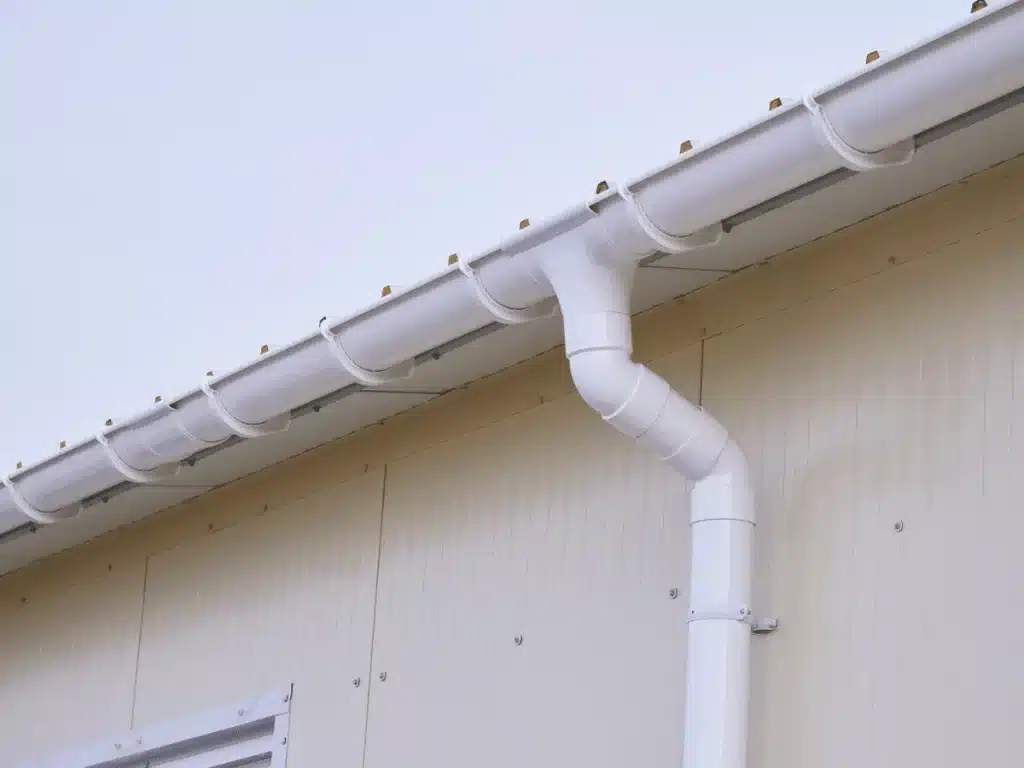
Vinyl gutters are popular for their low cost and easy installation. Made from PVC plastic, they are light and rust-resistant. Available in many colors, they match well with different home exteriors. However, they are not as strong as metal and may not suit areas with extreme weather.
Pros of Vinyl Gutters
- Affordable: Vinyl gutters are cheap, and ideal for budget-conscious homeowners.
- Easy to Install: Their light weight makes them easy to install, often as a DIY project.
- Rust-Free: Vinyl does not rust, making it good for humid or coastal areas.
- Color Choices: Vinyl comes in many colors, allowing for a cohesive look in your home.
Cons of Vinyl Gutters
- Less Durable: A vinyl gutter can crack or become brittle in extreme temperatures, leading to frequent repairs.
- Shorter Lifespan: They last about 20-25 years, shorter than their metal counterpart.
- Damage-Prone: Vinyl can be damaged by impacts like falling branches or heavy snow.
- Fades Over Time: Sunlight can cause vinyl to fade or discolor, affecting curb appeal.
Galvanized Steel Gutters
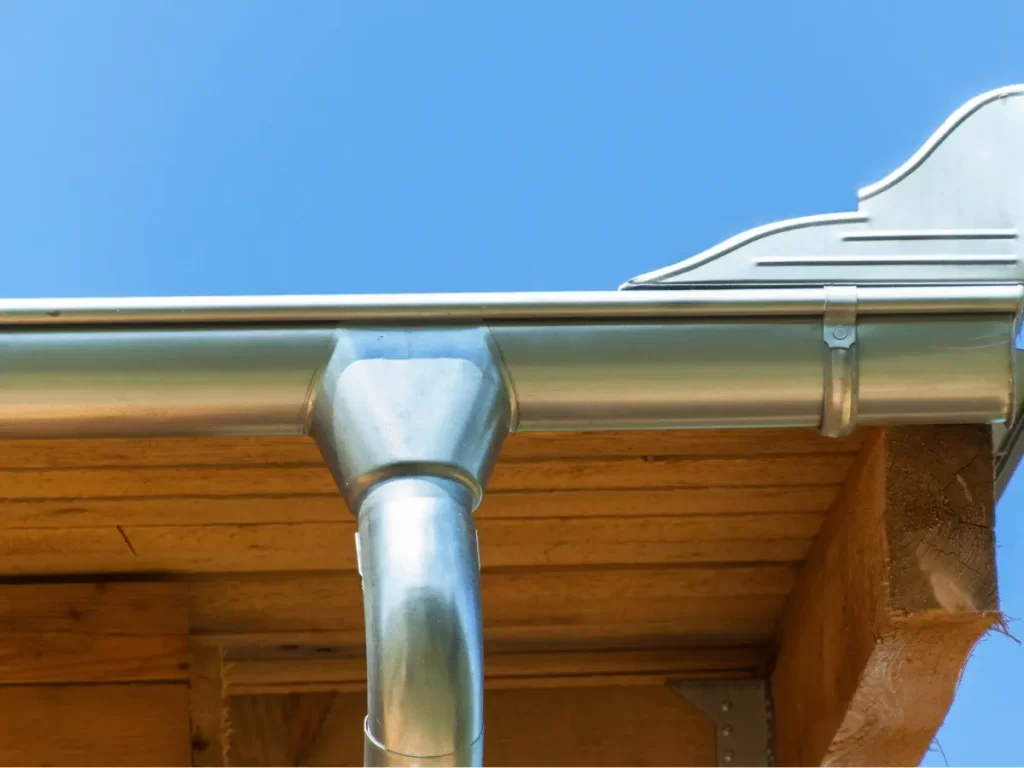
Galvanized steel gutters are made from steel coated with zinc to prevent rust. These gutters are strong and durable, suitable for harsh weather. They can be painted to match your home but need regular upkeep to prevent rust.
Pros of Galvanized Steel Gutters:
- Strong and Durable: They can handle heavy rain, snow, and wind, and are less likely to dent.
- Rust-Resistant: The zinc coating helps resist rust, making them good for humid or rainy areas.
- Paintable: They can be painted to match your home, enhancing curb appeal.
- Cost-Effective: They offer a good balance between cost and durability, being more affordable than copper but stronger than vinyl.
Cons of Galvanized Steel Gutters
- Rust-Prone: Despite the coating, they can rust if the zinc layer is damaged. Regular care is needed to prevent rust.
- Heavy: A galvanized steel gutter is heavier than aluminum or vinyl, making installation harder and possibly requiring professional help.
- Shorter Life: They usually last about 20 years, shorter than copper, and may need replacing due to rust and wear.
Stainless Steel Gutters
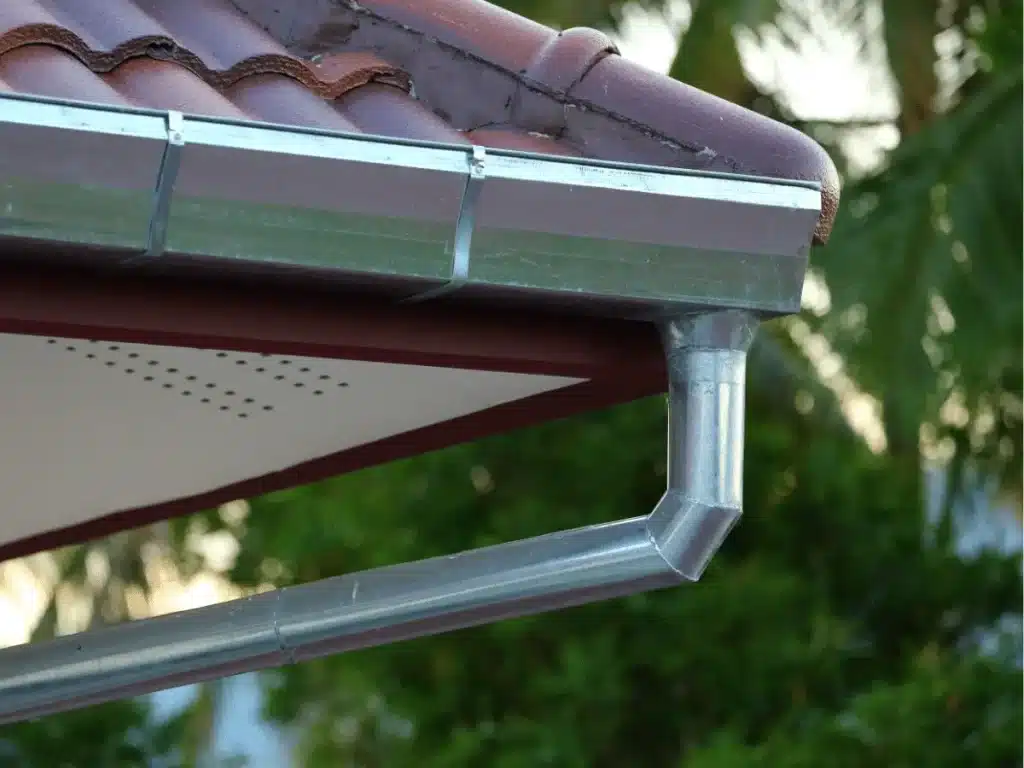
Stainless steel gutters are durable and sleek. Made from a metal alloy with chromium, they resist rust and corrosion. These gutters are strong and long-lasting, ideal for homeowners seeking low upkeep.
Pros of Stainless Steel Gutters
- Strong: They withstand severe weather, handling heavy rain and snow without denting.
- Rust-Free: The chromium in a stainless steel gutter prevents rust, perfect for wet climates.
- Long-Lasting: With care, they last 15 to 20 years, offering a solid return on investment.
- Attractive: Their shiny finish adds elegance, enhancing modern home designs.
Cons of Stainless Steel Gutters
- Costly: They are expensive, which can deter budget-minded homeowners.
- Heavy: Their weight makes DIY installation tough, often needing a professional.
- Salt Sensitivity: Coastal homes may face faster wear due to salinity, requiring more upkeep.
- Needs Cleaning: Despite their durability, they need regular cleaning to maintain looks and function.
Zinc Gutters
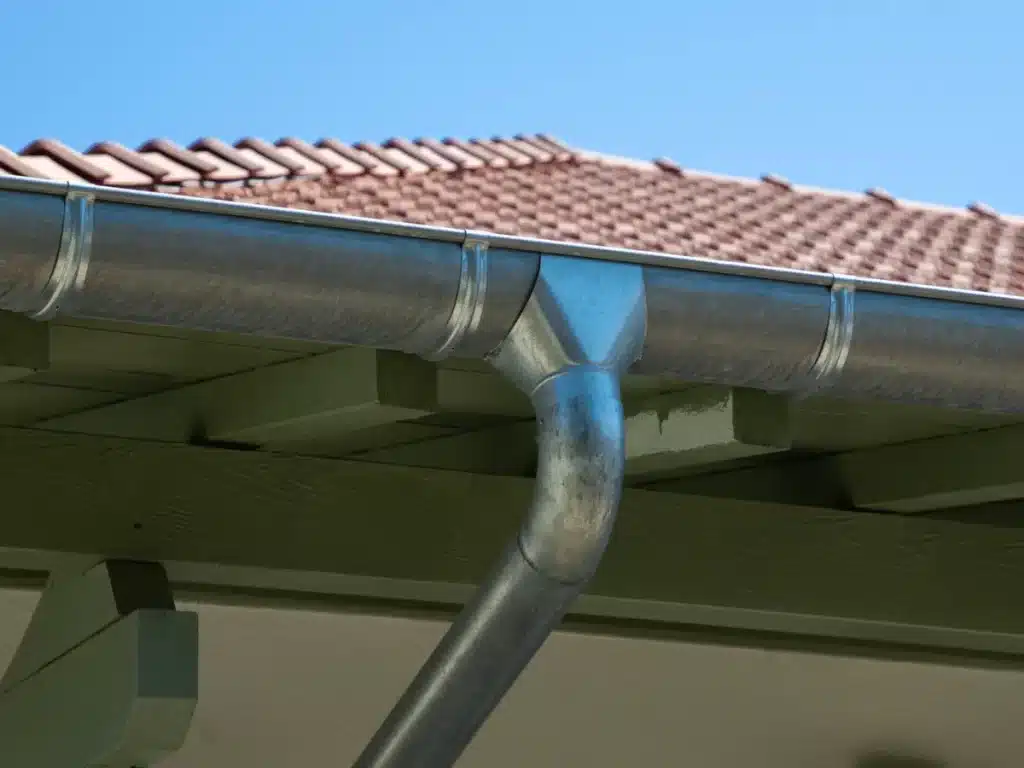
A Zinc made gutter is durable and needs little care. Made from a natural metal, they form a patina over time, which protects against corrosion. They are popular in high-end homes and historical projects.
Pros of Zinc Gutters
- Very Durable: They can last up to 90 years with proper care, offering great value.
- Cost-Effective: Cheaper than copper, zinc still provides a similar look and durability.
- Appealing Look: The patina gives a unique, rustic charm.
- Low Care: Zinc does not rust and requires less upkeep compared to other metals.
Cons of Zinc Gutters
- Pricier than Aluminum: More expensive than aluminum, affecting those on a budget.
- Salt Sensitivity: Coastal areas may see staining, needing careful maintenance.
- Hard to Install: Professional installation is often needed due to weight and cost.
- Limited Colors: Usually in a natural finish, painting is required for different colors, adding upkeep.
Considerations to Prioritize When Choosing a Gutter Material
When selecting the best gutter material for your home, it’s essential to consider various factors beyond just cost and appearance.
Understanding the long-term implications of your choice can help ensure that your gutters perform effectively and last as long as possible. Here are some crucial considerations to keep in mind.
Environmental Impact
Choosing environmentally friendly gutter materials can reduce your home’s carbon footprint. Here are some points to consider:
- Recyclability: Aluminum and steel are recyclable. They reduce waste and conserve resources.
- Production: Vinyl is less eco-friendly due to its manufacturing process. Opting for recyclable metals can make your home greener.
Climate Suitability
Different climates demand different gutter materials. Here’s what you need to know:
- Mild Climates: Vinyl is good for mild weather, handling moderate rain and temperature changes well.
- Varied Conditions: Copper and stainless steel are best for diverse climates. Copper resists corrosion in humid areas, while stainless steel handles extreme weather. Different climates demand different gutter materials.
Maintenance Requirements
Gutter maintenance varies by material. Consider the following:
- Low Care: Copper and zinc need less upkeep. Both form a protective layer that reduces maintenance.
- Higher Care: Aluminum and steel need regular checks to prevent rust and clogging. Vinyl also requires frequent inspections to avoid cracks.
FAQ
What are gutters made of?
Gutters are made from materials like aluminum, stainless steel, galvanized steel, copper, vinyl, and zinc. Aluminum is lightweight and rust-resistant.
Stainless steel is durable and less prone to damage. Copper is long-lasting with a unique look. Vinyl is cheap but less durable. Zinc is strong and develops a protective patina.
What is the best material for gutters?
The best material depends on your needs. A Copper or a stainless steel gutter is durable and low-maintenance. Aluminum is versatile and affordable, suitable for various climates. Vinyl is the cheapest but best for mild climates. Choose based on cost, durability, and home needs.
How much does it cost to install gutters per foot?
Costs vary by material. Aluminum costs $4-$9 per foot. Stainless steel is $9-$20 per foot. Copper is the most expensive at $15-$30 per foot. Vinyl is the cheapest at $3-$6 per foot.
How long do gutters last in a house?
Lifespan depends on material and upkeep. Aluminum and galvanized steel last 10-20 years. Stainless steel lasts up to 20 years. Copper and zinc can last 50-100 years with proper care.
What type of gutters lasts the longest?
A Copper gutter can last over 50 years, even up to 100 years, with proper maintenance. Despite high initial costs, their durability and low upkeep make them cost-effective long-term.

1 thought on “The Most Popular Types Of Gutter Materials For Your Home”
Comments are closed.